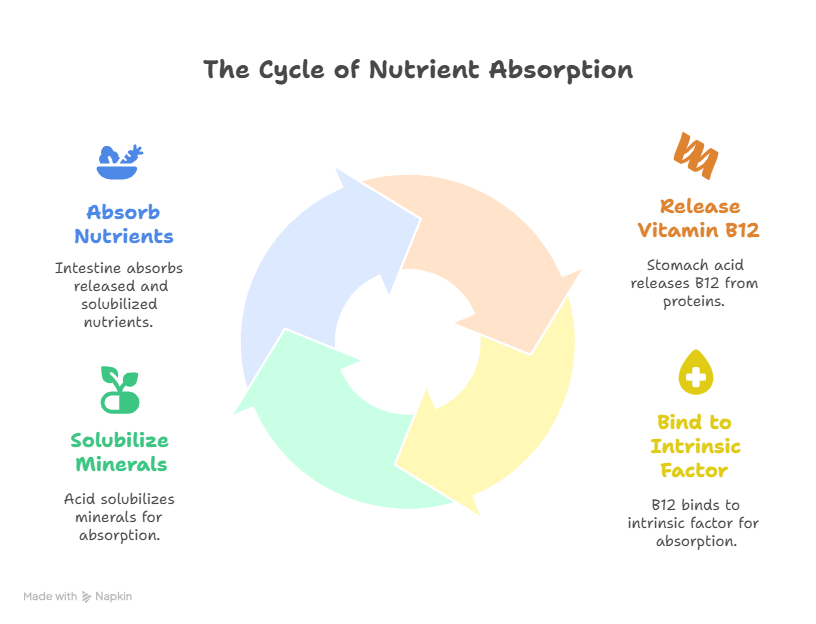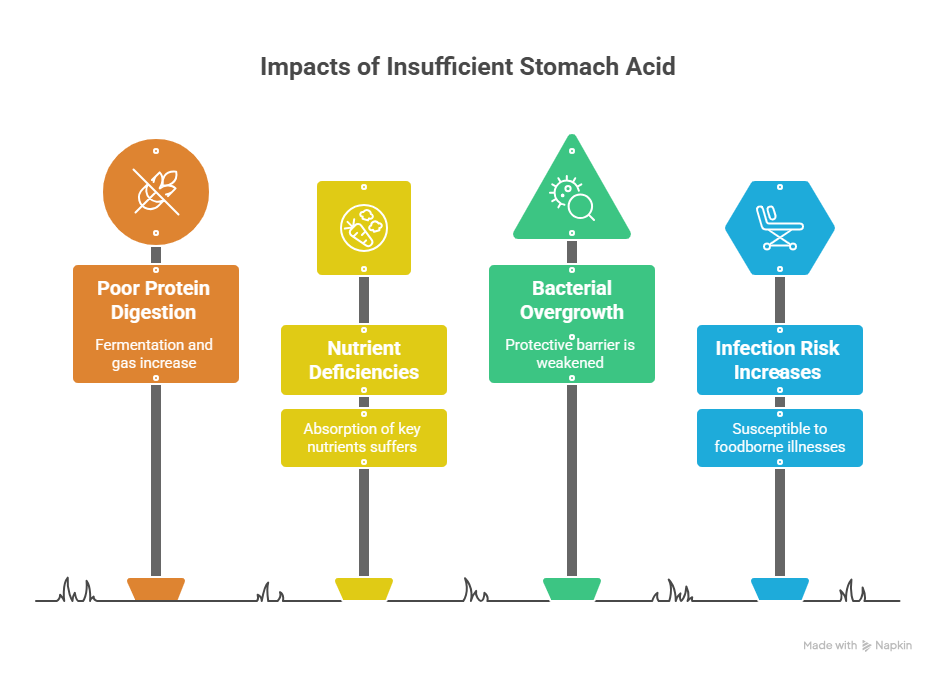Have you ever paused to think about the incredible chemistry happening right inside your body, especially after a delicious meal? Most of us tend to overlook the unsung hero of our digestive system: stomach acid. Far from being just a cause of heartburn or discomfort, understanding what is the role of acid in our stomach is fundamental to appreciating its profound importance for healthy digestion and overall well-being.
Often demonized, stomach acid (hydrochloric acid, or HCl) is actually a powerhouse, a crucial component that kickstarts the complex process of turning the food you eat into the nutrients your body needs to thrive. Without it, our digestive system would struggle, leaving us vulnerable to nutrient deficiencies and various health issues. So, let’s embark on a journey to uncover the fascinating secrets behind this vital digestive fluid.

Beyond Just Digestion: The Multifaceted Role of Stomach Acid
When we talk about what is the role of acid in our stomach, digestion is certainly at the forefront, but it’s just one piece of a much larger puzzle. This highly acidic environment serves several critical functions that extend far beyond simply breaking down food.
1. The Mighty Protein Destroyer: Initiating Protein Digestion
Imagine your stomach as a high-tech blender designed to break down tough proteins. This is where stomach acid truly shines. When food enters your stomach, the parietal cells in your stomach lining release hydrochloric acid. This acid creates an extremely low pH environment (typically between 1.5 and 3.5), which is essential for two key reasons related to protein digestion:
- Denaturing Proteins: The strong acid literally “unfolds” or denatures the complex, coiled structures of proteins. Think of it like untangling a ball of yarn – once it’s untangled, it’s much easier to cut into smaller pieces. This denaturing process is crucial because it exposes the peptide bonds within the protein, making them accessible for the digestive enzymes.
- Activating Pepsinogen to Pepsin: The stomach also produces an inactive enzyme called pepsinogen. This enzyme cannot digest proteins on its own. However, in the highly acidic environment created by HCl, pepsinogen is converted into its active form, pepsin. Pepsin is the primary enzyme in the stomach responsible for breaking down denatured proteins into smaller polypeptide chains. These smaller chains then move to the small intestine for further digestion. Without adequate stomach acid, this critical first step in protein breakdown would be severely hampered. This is arguably the most recognized aspect of what is the role of acid in our stomach.
2. The First Line of Defense: Killing Harmful Pathogens
One of the most vital, yet often overlooked, aspects of what is the role of acid in our stomach is its function as a powerful antimicrobial barrier. The extremely low pH of stomach acid is hostile to most microorganisms. When you eat, along with your food, you inevitably ingest bacteria, viruses, fungi, and parasites. Many of these would otherwise cause severe food poisoning or infections.
Stomach acid acts as a natural sterilization system, effectively killing the vast majority of these ingested pathogens before they can reach the more vulnerable parts of your digestive tract, like the small intestine. This protective role is crucial for maintaining gut health and preventing foodborne illnesses. Without sufficient stomach acid, you would be far more susceptible to gastrointestinal infections, a significant risk to your overall health.
Experiencing stomach discomfort? Book an appointment with our specialist today to get expert guidance on digestive health.
Book an appointment3. Nutrient Absorption Facilitator: Unlocking Essential Vitamins and Minerals

Beyond initial digestion, stomach acid plays a critical role in making certain essential nutrients available for absorption later in the small intestine. This is a subtle but powerful aspect of what is the role of acid in our stomach:
- Vitamin B12 Release: Vitamin B12 is tightly bound to proteins in food. Stomach acid is necessary to release B12 from these proteins. Once released, B12 then binds to intrinsic factor, a protein also produced in the stomach, which is essential for its absorption in the small intestine. Insufficient stomach acid (a condition called hypochlorhydria) can lead to Vitamin B12 deficiency, causing neurological problems, anemia, and fatigue.
- Mineral Solubility: Minerals like iron, calcium, magnesium, and zinc are better absorbed in an acidic environment. Stomach acid helps to solubilize these minerals, converting them into forms that are more readily absorbed by the intestinal lining. For example, iron from plant sources (non-heme iron) is particularly dependent on stomach acid for optimal absorption. Chronic low stomach acid can lead to deficiencies in these vital minerals, impacting bone health, energy levels, and numerous bodily functions.
4. Regulating the Digestive Cascade: Signaling Downstream Processes
Stomach acid isn’t just working in isolation; it’s a key player in signaling the rest of the digestive system. The presence of acid in the stomach acts as a trigger for subsequent digestive steps:
- Gastric Emptying: The acidity of the chyme (partially digested food mixed with stomach acid) plays a role in regulating how quickly the stomach empties its contents into the small intestine.
- Pancreatic Enzyme Release: As acidic chyme enters the small intestine, it stimulates the release of hormones (like secretin and cholecystokinin) that, in turn, signal the pancreas to release digestive enzymes (such as amylase, lipase, and proteases) and bicarbonate. Bicarbonate is crucial for neutralizing the stomach acid in the small intestine, creating an optimal environment for pancreatic enzymes to work.
- Bile Release: These hormones also stimulate the gallbladder to release bile, which is essential for fat digestion and absorption.
So, while the acid itself doesn’t directly act in the small intestine, its presence and proper functioning in the stomach are vital for the smooth operation of the entire digestive cascade. This intricate signaling mechanism highlights another complex facet of what is the role of acid in our stomach.
When Stomach Acid Goes Awry: Too Much or Too Little
While the functions of stomach acid are undeniably beneficial, problems arise when its levels are either too high or too low.
Experiencing stomach discomfort? Book an appointment with our specialist today to get expert guidance on digestive health.
Book an appointmentToo Much Acid (Hyperchlorhydria/Acid Reflux)
This is what most people typically think of when they hear “stomach acid.” Conditions like acid reflux (heartburn), GERD (Gastroesophageal Reflux Disease), and peptic ulcers are often associated with symptoms of too much acid. However, it’s crucial to understand that while symptoms like heartburn feel like too much acid, the underlying issue might be a weakened Lower Esophageal Sphincter (LES) that allows normal amounts of acid to escape into the esophagus, rather than the stomach producing excessive acid. True hyperchlorhydria is less common than reflux issues caused by LES dysfunction.
Symptoms can include:
- Burning sensation in the chest or throat (heartburn)
- Sour taste in the mouth
- Regurgitation of food or sour liquid
- Difficulty swallowing
- Bloating, gas, and abdominal discomfort
Common culprits that can exacerbate these symptoms include fatty or spicy foods, caffeine, alcohol, stress, obesity, and certain medications.
Too Little Acid (Hypochlorhydria/Achlorhydria)

This is a lesser-known but surprisingly common problem, especially as we age. Paradoxically, many symptoms of low stomach acid can mimic those of high acid, leading to misdiagnosis and inappropriate treatment.
When there’s not enough stomach acid, the following issues can arise, profoundly impacting what is the role of acid in our stomach:
- Poor Protein Digestion: Food remains in the stomach longer, leading to fermentation, gas, bloating, and nutrient malabsorption. Undigested proteins can also trigger immune reactions and allergies.
- Nutrient Deficiencies: As mentioned, B12, iron, calcium, magnesium, and zinc absorption suffer.
- Bacterial Overgrowth (SIBO): The stomach’s protective barrier is weakened, allowing bacteria from the small intestine or ingested pathogens to survive and overgrow, leading to chronic digestive issues like bloating, gas, and altered bowel habits.
- Increased Risk of Infections: You become more susceptible to foodborne illnesses.
Symptoms of low stomach acid can include:
- Bloating, burping, and gas shortly after meals
- Feeling of fullness after eating small amounts
- Nausea after taking supplements
- Undigested food in the stool
- Hair loss, brittle nails
- Chronic fatigue
- Recurrent candida infections
- Heartburn (due to fermentation and pressure pushing acid up, not excessive acid)
Causes of low stomach acid can include aging, chronic stress, H. pylori infection, antacid overuse (which can create a vicious cycle), and certain autoimmune conditions.
Experiencing stomach discomfort? Book an appointment with our specialist today to get expert guidance on digestive health.
Book an appointmentMaintaining Your Stomach Acid Balance for Optimal Health
Understanding what is the role of acid in our stomach is the first step; the next is to support its healthy function. Here are some tips for fostering a balanced digestive environment:
- Eat Mindfully: Slow down, chew your food thoroughly, and avoid eating when stressed or rushed. This prepares your digestive system for incoming food.
- Hydrate Wisely: Drink water between meals, not excessively during meals, as too much liquid can dilute stomach acid.
- Manage Stress: Chronic stress significantly impacts digestion. Incorporate stress-reducing activities like yoga, meditation, or deep breathing into your daily routine.
- Avoid Trigger Foods: Identify and limit foods that exacerbate your symptoms, whether they are spicy, fatty, acidic, or simply foods you find hard to digest.
- Limit Alcohol and Caffeine: Both can irritate the stomach lining and affect LES function.
- Don’t Eat Before Bed: Give your stomach at least 2-3 hours to digest before lying down.
- Consider Digestive Support (under guidance): For those with confirmed low stomach acid, some individuals find relief with a doctor-recommended Betaine HCl supplement, taken with protein-rich meals. However, this should only be done under medical supervision, as it can be harmful if taken inappropriately.
- Probiotics: Supporting a healthy gut microbiome can indirectly aid digestion and reduce inflammation.
- Ginger and Apple Cider Vinegar: Some people find that a small amount of diluted apple cider vinegar (before meals) or ginger (in tea or food) can aid digestion, though scientific evidence is mixed and individual responses vary. If you have active reflux, ACV might worsen it.
When to Seek Professional Help
While lifestyle changes can make a big difference, if you consistently experience severe digestive discomfort, unexplained nutrient deficiencies, or suspect an imbalance in your stomach acid (whether too much or too little), it’s crucial to consult a healthcare professional. They can accurately diagnose the underlying cause of your symptoms through various tests and recommend the most appropriate treatment plan.
Your digestive health is a cornerstone of your overall well-being. By understanding what is the role of acid in our stomach and how to nurture its balance, you’re taking a powerful step towards a healthier, happier you.
Experiencing stomach discomfort? Book an appointment with our specialist today to get expert guidance on digestive health.
Book an appointmentFrequently Asked Questions
Can acid reflux be a sign of too little stomach acid instead of too much?
Yes, paradoxically, some symptoms commonly associated with “too much acid,” like heartburn, can be caused by too little stomach acid. When stomach acid is insufficient, food can sit in the stomach longer and ferment, producing gases that increase pressure and push acid up into the esophagus.
What is the ideal pH level for stomach acid?
The ideal pH for stomach acid is highly acidic, typically ranging between 1.5 and 3.5. This low pH is crucial for activating digestive enzymes, denaturing proteins, and killing harmful bacteria ingested with food.
Can long-term use of antacids or PPIs harm stomach acid function?
Yes, long-term use of antacids or proton pump inhibitors (PPIs), which significantly reduce stomach acid production, can interfere with the natural role of stomach acid. This can lead to issues like nutrient deficiencies (especially B12 and minerals) and increased susceptibility to infections, by disrupting the stomach’s natural barrier function.
How does stress affect stomach acid production?
Stress can significantly impact stomach acid production. Chronic stress can shift the body into a “fight or flight” mode, which diverts resources away from digestion, potentially leading to reduced stomach acid secretion and impaired digestive function
Is it true that stomach acid protects us from food poisoning?
Absolutely. One of the primary functions of the highly acidic environment in the stomach is to act as a crucial first line of defense against harmful bacteria, viruses, fungi, and parasites ingested with food. This helps to kill most pathogens before they can cause infection in the intestines.
Can eating specific foods help balance stomach acid?
While no specific food can dramatically alter stomach acid pH in the long term, some foods can help manage symptoms or support overall digestive health. For instance, lean proteins support acid production, while foods high in fiber can aid overall digestion. Conversely, avoiding trigger foods like spicy or fatty items can prevent acid reflux symptoms.
For any persistent or severe digestive concerns, including prolonged symptoms of acid imbalance, it’s always best to consult with medical professionals. Specialized care for digestive health, including comprehensive diagnostics and personalized treatment plans, is available at leading healthcare providers. For expert advice on your digestive well-being, you can consider reaching out to Raj Hospitals. They are equipped to provide the necessary support and guidance for a healthy gut. Your health is your wealth, and understanding what is the role of acid in our stomach is a powerful step towards safeguarding it.
.svg)










